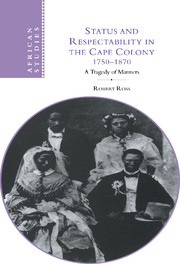Book contents
6 - Outsiders
Published online by Cambridge University Press: 07 July 2009
Summary
The antithesis to respectability was drunkenness. When Dr Philip's opponents wished to ridicule him and those he worked with, they portrayed the mission Khoikhoi as simplistic drunks. South Africa's oldest surviving play, C. E. Boniface's De Temperantisten (1832), for instance, portrays, a number of Khoi ex-convicts drinking and brawling in the streets before heading off to the canteen, or liquor shop, to prepare themselves for the inauguration of the local temperance society. The meeting where this would happen was run by Dominee Humbug Philipumpkin (John Philip) and Sir John Brute (Fairbairn). It was, apparently, a most successful farce, though naturally enough it was not appreciated by its targets. Equally a few years later, Andrew Geddes Bain made use of the same motifs in Kaatje Kekkelbek, a sketch that was heavily influenced by Boniface, but was now transferred to the setting of Grahamstown and was largely in English. The drunkenness of the ‘Hottentot’ characters, for all their connections with the missions, was just as evident.
What they wrote, they also drew. Almost all the significant artists of the nineteenth-century Cape could present some vicious images of slave and Khoikhoi drunkenness and debauchery. In the 1820s and 1830s, H. C. De Meillon drew slaves smoking dagga (marijuana) and Sir Charles D'Oyly portrayed drunken slaves on the streets of Cape Town above the title: ‘The South African besetting sin’.
- Type
- Chapter
- Information
- Status and Respectability in the Cape Colony, 1750–1870A Tragedy of Manners, pp. 125 - 145Publisher: Cambridge University PressPrint publication year: 1999

